They speak the same language
They love the same Yerba Mate
They are both World Champions
And share a tremendous passion for Barbecue – or “un asado”.
These two countries have so many similarities that when deciding where to live, work remotely, or retire abroad, people ask:
Uruguay
Or Argentina?
Which one is better?
Or are they pretty much the same? Hint: they are not.
While so many things are similar between those two neighbors, others, like the rhythm of life, the social issues, and, most of all, the cost of living change tremendously between Argentina and Uruguay
Today you will discover the Pros, Cons and how much you would need to spend to live and retire in Argentina and Uruguay
And our comparison will be apples.
First, we will give the pros, cons, and costs of living in the capital of Argentina, Buenos Aires, versus the capital of Uruguay, Montevideo
Then, will come an even more interesting comparison, between living in one of the most desired cities for expats in Argentina, Mendoza, versus its Uruguayan rival, Maldonado
Then, we will compare how your pension or income from abroad will be taxed in both countries. That is VERY important, so what until the end
And then I will give you a final score: which country is the best right now for you.
Ready?
So let’s start comparing the…
Pros and cons of the two capitals, Buenos Aires and Montevideo.

We Start With How Safe is To Live in Argentina vs Uruguay
And here there is a surprise: many Argentinians would think that Buenos Aires is dangerous and Montevideo is safer.
Not really. In fact, both cities are quite equivalent.
Buenos Aires improved a lot in this aspect. The number of robberies in the last years dropped to less than half what it was in 2016.
Meanwhile, Montevideo concentrates most of the national crime. The countryside of Uruguay is WAY safer than Montevideo.
With the improvement of the Argentinian capital and the worsening of the Uruguayan counterpart, nowadays they have similar numbers.
However, that is important to remember: Buenos Aires is way larger, and likely the dangerous parts of Buenos Aires are more dangerous than the dangerous parts of Montevideo.
So in terms of violence, we have a tie between the two capitals.

The next factor is the weather.
Since the two cities are only 213 kilometers apart you might think that both would have a similar climate.
However, they are slightly different: Montevideo has a bit less of rainfall, is less humid, and during summer, is not as hot as Buenos Aires
But the worst is how different those cities react to their weather conditions.
Buenos Aires is a large city that might quickly turn chaotic if it rains a lot. In Montevideo, not so much.
So here, the point is for Montevideo.
Let’s talk now about private healthcare.
Buenos Aires offers excellent private healthcare, with modern facilities and highly trained professionals. Even the best hospitals like Otamendi, Hospital Italiano, or Hospital Austral have costs much lower than mid-range hospitals in the US (hold on because we will talk more about costs in a few minutes).

Montevideo also has a good healthcare system with quality private healthcare services, but not in the same proportion as Buenos Aires, and the costs might be higher.
Point for the Argentinians.
Pollution
Here is a clear point for Montevideo. Not only it is smaller, it is also cleaner and has some geographic advantage, since the winds drive the Pollution away to… Buenos Aires.
3X2 for Montevideo so far.
So time for the cost of living!
And what better indicator for living costs than HOUSING?
So I selected a few apartments and houses that you can afford paying between $800 to $900 per month in rent (or mortgage) in each city.
In Buenos Aires for $800 dollars you will rent a 45sqm, 1-room apartment in the district of Palermo Hollywood, which is an upper class district, I had been there few times, nice place]
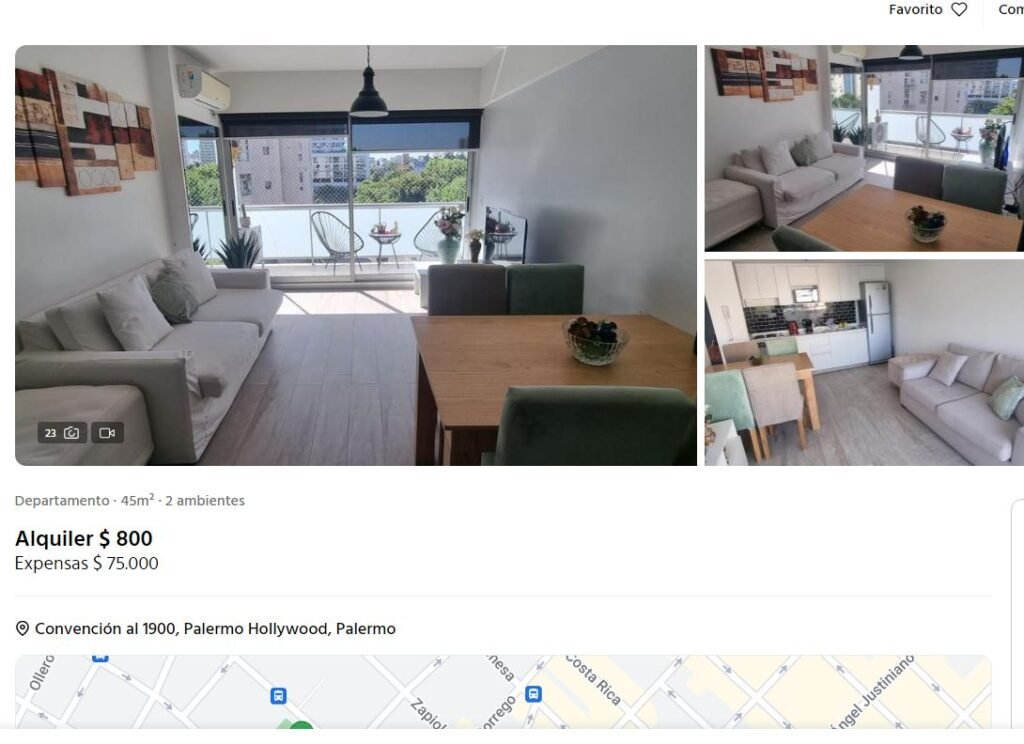
A bit noisy if you live close to a bar or a club, but other than that it is a fine neighborhood.
Also in this range of price, $850 dollars, there are some larger apartments in Recoleta, which might not be as good a neighborhood like Palermo, but it is still ok.
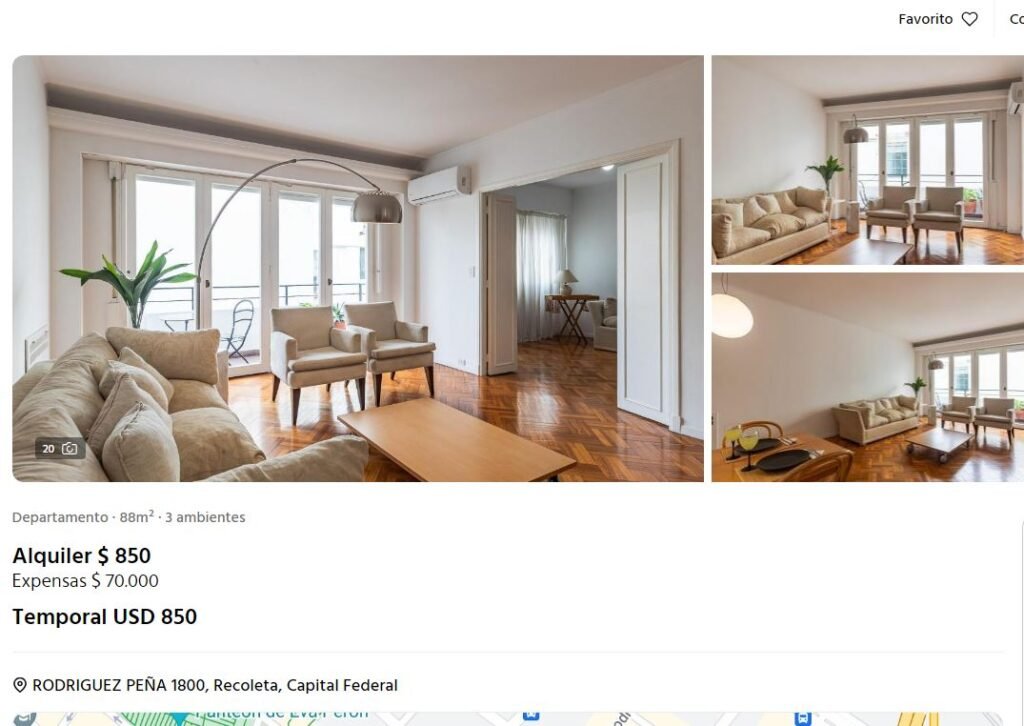
The largest place I found for less than $900 is this apartment with 88 sqm and nice, large windows. That is important in such a humid place.
In Montevideo, the apartments I found for this price are between 40 to 80 square meters, on average maybe a bit smaller than those in Buenos Aires
BUT…
One curious thing that I noticed is that many apartments in this range of prices were located in buildings with swimming pools!
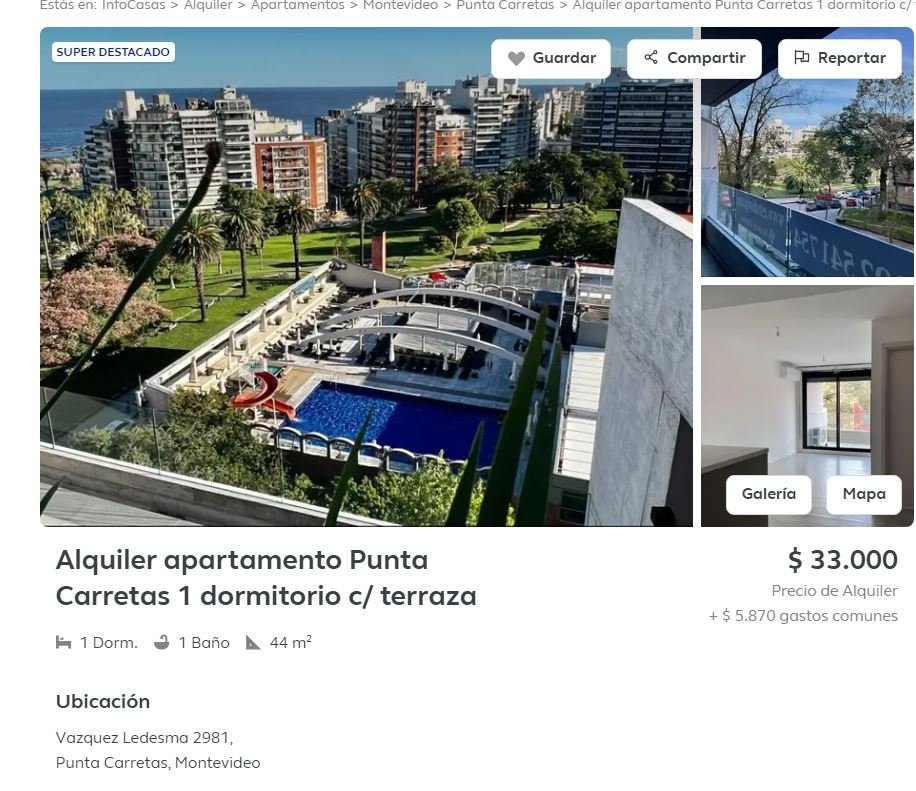
And in quite expensive areas, like this one in Punta Carretas.
Punta Carretas, by the way, is a very beautiful, very safe, and very well connected by public transport district from Montevideo.
So in terms of housing costs, I would say that it is also a tie. Buenos Aires has slightly higher apartments for less than $900, but the ones in Montevideo have better, more luxurious amenities.
So we end with a victory for Montevideo with 4 to 3 of Buenos Aires.
But… we all know that when you are planning to move to retire abroad or work remotely, you will not choose the capital. They are among the most expensive places after all.
So what if we compare one of the most attractive cities for expats in Argentina, Mendoza, versus Maldonado, which attracts Expats and retirees in Uruguay?

Mendoza (Argentina) vs Maldonado (Uruguay)
Mendoza itself is not a big city, it has 115 thousand residents, but it is inside a metropolitan area of 1 million residents. It is a wine region close to the Andes mountains and the border with Chile.
Maldonado in Uruguay is a city with less than 100,000 residents, in the Atlantic coast, very enticing for beachgoers and those who enjoy the sea breeze. It is considered a charming retirement destination.
So, yeah, this is a difficult clash. Both cities are stunning.
The first criterion we talk about is safety.
Mendoza generally has lower crime rates compared to larger Argentine cities. Their homicide rate is very low, 3 per 100,000 people, which is less than half of the US for example.
But there are other types of more frequent crimes, especially pickpocketers, thieves, and so on.
That is what a local told us about Mendoza:
“It’s not heaven, of course, it has some “favelas” and there’s some crime, but it’s only present in the outer neighborhoods, touristic areas are 100% safe, so safe that I’m sure I can be walking around midnight looking at my phone and nothing’s gonna happen.”
So it is like a big city after all.
Meanwhile, the Uruguayan rival, Maldonado, has a very strong touristic appeal, and therefore has also more surveillance. During the peak season, there are some occurrences of thievery and pickpockets, but out of the season, it is very calm. It is actually perceived as one of the safest places in Uruguay .
Verdict: Point for Maldonado.
The size difference that benefited Maldonado when talking about safety, plays in favor of Mendoza if we talk about…
Private healthcare in Mendoza vs Maldonado
Mendoza has a more ample offer of private hospitals. Also, according to locals, the public hospitals there are quite decent when compared to those from the rest of Argentina,
the biggest issue is the waiting time for many procedures.
Point for Mendoza.
In terms of social life and entertainment…
…the two cities are quite different.
Known for its wine culture, Mendoza offers numerous wineries and wine-related events. The city has a vibrant cultural scene both for locals and tourists.
And Mendoza receives a lot of tourists, especially from Argentina and Brazil. There is even a tradition among Brazilians that their first trips abroad are either to Mendoza, to Buenos Aires or to Bariloche.
Maldonado also has plenty of options for entertainment, much more than what you would expect for a city of 100,000 residents. This is because in the region of Maldonado is Punta del Este.
Imagine Punta Del Este as a South American version of Las Vegas – albeit smaller. It has casinos, concert venues, and good restaurants.
During the tourist season, there is a lot to do there.
HOWEVER…
Off-season, Maldonado might turn a bit boring.
So in terms of social life and entertainment, point for Mendoza due to its year-round options.
What about the weather in Mendoza and Maldonado?
Here both cities are also very, very different.
Mendoza has a semi-arid climate with hot summers and mild winters. It experiences low humidity and significant sunshine throughout the year, characteristics that many seek in the best places to retire.
If you don’t like rain, Mendoza is the place for you. It rains less than 45 days per year on average.
Meanwhile, Maldonado has a temperate climate with mild summers and cool winters. It experiences higher humidity and more rainfall, and it has the 4 seasons of the year well-marked.
To say which one is better is quite subjective. None are really bad.
So let’s give it a tie.
So far the score is Mendoza 3, Maldonado 2.
Let’s talk about the last factor. The one that might decide which city is the best:
The COST OF LIVING in Mendoza and Maldonado
And again, we will compare housing prices, since this is the lion’s share of the cost of living if you plan to retire in Argentina or Uruguay.
I found that Maldonado in Uruguay has prices very similar to Montevideo. In general, for less than $900 dollars you will find apartments between 45 and 75 square meters
Like this one in Playa Mansa
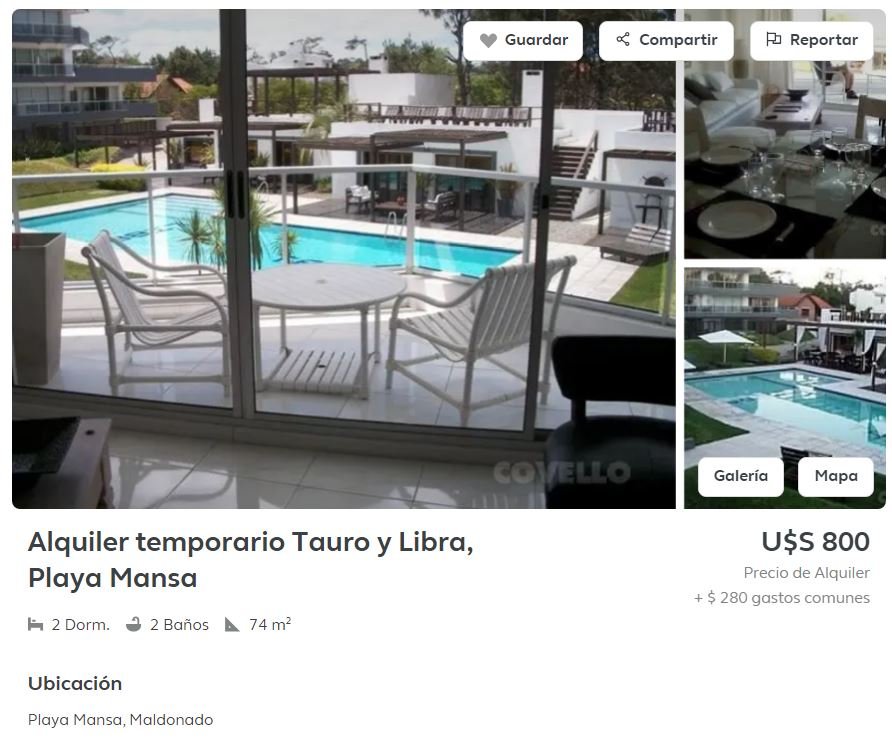
Playa Mansa by the way is one of the trendiest beaches in the city.
It is interesting to see that in Maldonado, as in Montevideo, the apartments have some nice facilities and most of them have access to swimming pools.
And what did we find in Mendoza for less than $900 monthly? Mendoza, which could be one of the best places to retire, offers affordable living.
That will be a surprise….
So in Mendoza, for 900 dollars or less, I found much larger properties.
This apartment here, for example, has 100 square meters and costs only $800 per month.
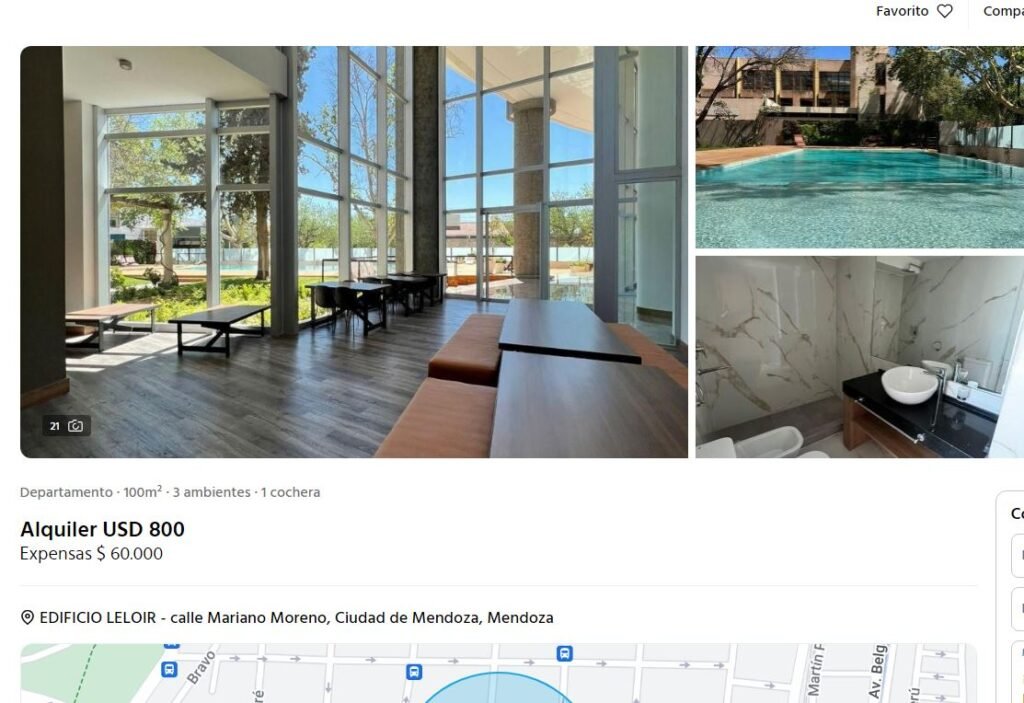
With a large swimming pool
A fully equipped gym
And the superior quality of the finishing and furniture is evident. And all that for $800!
It was not the only one that I found for this price.
In the greater Mendoza, I found a 150-square-meter apartment in an A-class building for $900.
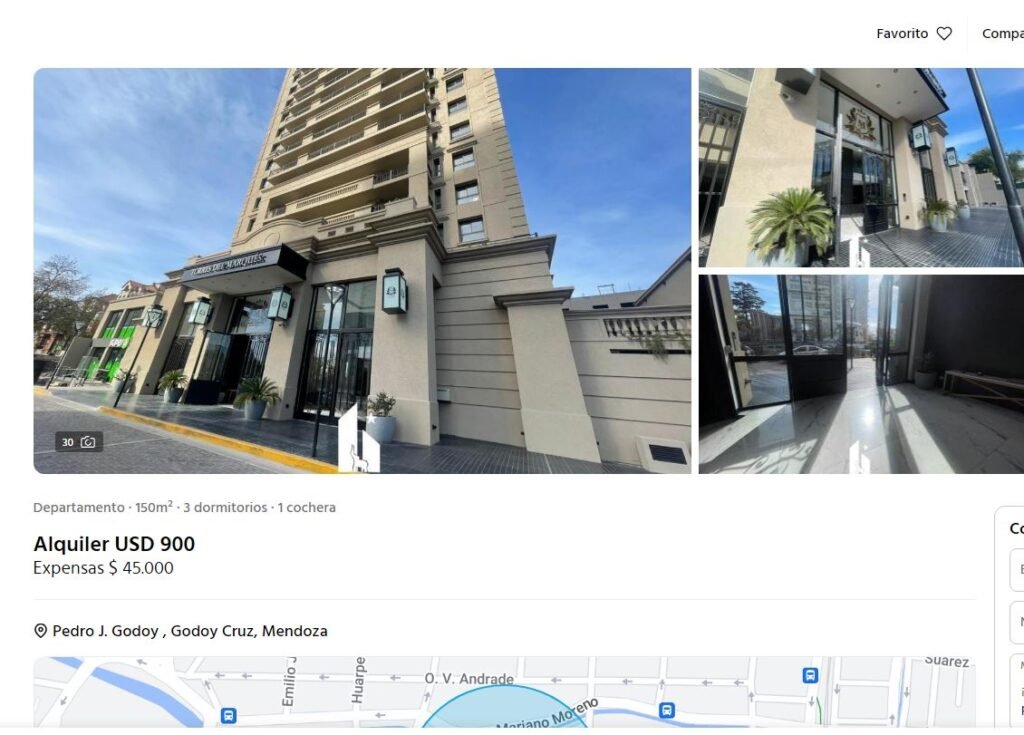
Looks more like an expensive hotel than an ordinary apartment building.
If instead of an apartment, you prefer a spacious house, you could easily rent this 180-square meter house in Mendoza, for 900 dollars!
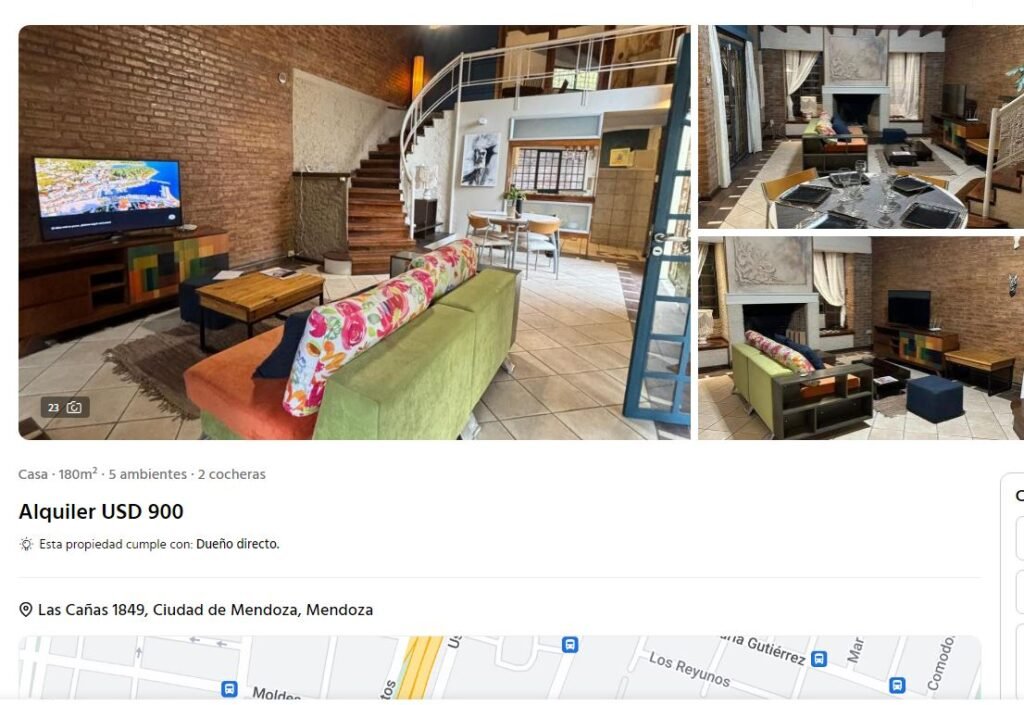
So Mendoza, the Argentinian wine capital, easily won our cost comparison against Maldonado.
And the final score is Mendoza 4, Maldonado 3.
If you prefer to live in a capital city after retirement, probably you should choose to retire in Uruguay, since Montevideo has a slight advantage over Buenos Aires.
Otherwise, Argentina, and especially Mendoza, appears to be a much better alternative.
Not saying that Uruguay is bad. It is probably the most stable country in entire South America. But the cost of living there is high, at least when we compare it to Argentina.
But WAIT!
What about the taxes to retire in Argentina vs the taxes to retire in Uruguay?
If you are moving to either Uruguay or Argentina, and your pension will come from abroad, the taxes are an important aspect.
Which country is better than?
If you retire in Argentina, during the first 12 months, you will not pay any income tax. Period.
After that, you will still not pay taxes on income from pensions abroad,
but… you might need to pay taxes on income from dividends of your investments – around 15%.
Even if your investments are located abroad, like on the New York Stock Exchange.
Of course, the amount of taxes can be reduced due to taxation agreements between Argentina and your country, but still, there is a tax to pay over dividends and some types of investment gains.
On the other side of the Rio de La Plata, we have Uruguay, and moving your tax residence there offers some unique tax benefits
Including… and listen to that carefully:
In Uruguay, you have a 10-year tax holiday on foreign-sourced income.
And since new tax residents are not taxed before one year (like in Argentina), that means an effective tax holiday of 11 years!
During this period, you won’t pay taxes on income generated outside Uruguay or on interest and dividends from non-Uruguayan companies!
After 11 years, you will start to pay taxes, but even then, it is only 12%, less than the 15% of Argentina.
And income from owning or renting property abroad remains tax-free.
Incredible, right?
Honestly, there are not many countries in the world that have so advantageous tax schemes for expat retirees like Uruguay.
Yes, Uruguay is more expensive than Argentina, and yes, Mendoza is better than Maldonado. Both areas offer distinct advantages as retirement destinations. But these tax advantages offered for those thinking of retiring in Uruguay might easily change the final score of which one is the best for expat retirees.
So what do you think? Retirement in Uruguay, or retiring in Argentina? Let us know in the comment section!
Do you know which Latin-American country eliminated most of the violence, has wonderful beaches, fantastic nature, kind people, and is still very inexpensive?
El Salvador! Discover more about this country and its impressive improvement here.
By the way, their president just announced an opportunity for foreigners to become permanent residents of El Salvador with multiple incentives. It sounds like a very attractive idea, and they have Bitcoin as a legal tender!
Levi Borba is the founder of expatriateconsultancy.com, creator of the channel The Expat, and best-selling author.. You can find him on X here.




